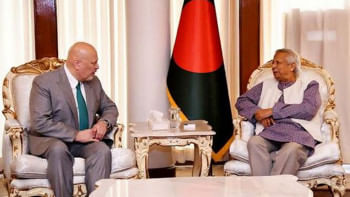In time, with less cost

In a country where red tape and bureaucratic tangles often delay the process of implementing any project on time, a unique example has been set in completing a big government project.
The Information and Communication Division in 2014 took up the project -- “Sheikh Russel Digital Lab” -- to set up 2,001 computer labs and 65 language centres in high schools, colleges and madrasas across the country.
The total cost of the project was Tk 298.98 crore. Time allocated for implementing it was just two years, starting from January 2015.
The project has not only been completed six months before the deadline of December 2016, but also around one-third of the allocated fund worth Tk 96 crore has been saved.
The project authorities have now decided to set up 800 new labs and 100 digital classrooms in other schools with the surplus money.
“Prudent management and proper monitoring have helped us deliver the project successfully,” Emdadul Haque, project director, told The Daily Star at his project office in the capital's Agargaon recently.
“In every phase -- from tendering to selection of centres and procurement -- we tried to be efficient, but not compromising with the quality,” said the happy PD.
The project officials bargained with the vendors and were able to motivate them that this is a benevolent project taken to equip high school and college-going students with modern computer and technical skills.
For example, Microsoft's Bangladesh office gave us their products at a much subsidised rate, said ASM Shafiul Alam Talukder, assistant project director.
Under this project, every digital lab has got 17 laptops of globally reputed brands like HP, Dell and Lenovo along with six months' free wifi (internet) connection. Every centre has also got a printer, a scanner, a multimedia projector, 17 headphones and a router in addition to table and chair both for trainees and trainers. Every centre has been given Tk 30,000 for renovation work of lab rooms.
Of the 2,001 computer labs, 544 labs are in 17 districts of Dhaka Division, 387 in 11 districts of Chittagong Division, 228 in 10 districts of Khulna Division, 295 in eight districts of Rajshahi Division, 218 in eight districts of Rangpur Division, 183 in six districts of Barisal Division and 146 in four districts of Sylhet Division.
According to project officials, some 10 lakh students, mostly rural and semi-urban, will be able to get ICT education from these labs.
Another interesting component of the project is 65 language training centres, which have been set up in 64 districts. Students and jobseekers will get the opportunity to learn nine foreign languages -- Arabic, Chinese, English, French, German, Japanese, Korean, Russian and Spanish.
Over 1,000 people, mostly teachers, are being trained to become master trainers on these languages.
Project officials worked hard in implementing the project on time and within budget, yet they are not complacent, as, they said, the success of the project would depend on proper monitoring by the people concerned at the local level.
According to Talukder, the local ICT department and district and upazila administrations have to monitor whether these centres are being run effectively.
“We have started the project, but we want the education ministry to take over the management and monitor the centres,” he added.


 For all latest news, follow The Daily Star's Google News channel.
For all latest news, follow The Daily Star's Google News channel. 



Comments